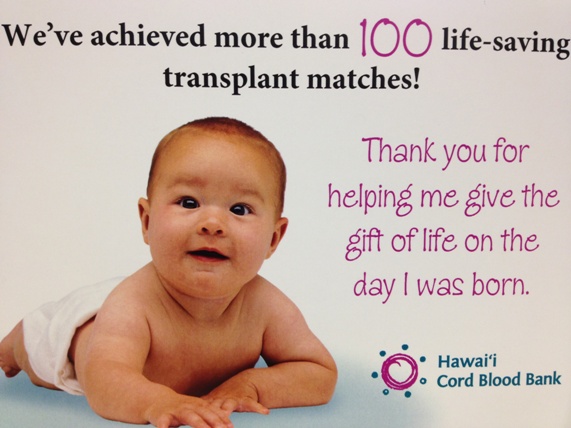100th Transplant Celebration Recap

Cord blood units collected from volunteer donors in Hawai'i have been for years saving the lives of gravely ill individuals in need of life saving stem cell transplants. In April, local units collected and banked through the Hawai'i Cord Blood Bank achieved a significant milestone when its 100th unit was used to transplant an adult patient suffering from a form of leukemia, a life-threatening form of blood cancer.
Over the past eight years, Hawai'i units have been transplanted in patients from the United States, Spain, France, Italy, Australia, Brazil, Turkey, and Germany. In general, cord blood units, which are donated by a mother after the safe delivery of her baby, are used to help individuals with leukemia, lymphoma, and other life-threatening diseases.
Dr. Randal Wada, medical director and founder of the Hawai'i Cord Blood Bank said, "This remarkable achievement is a great testament to Hawai'i's unique program and highlights the rich ethnic diversity of our donors."
Dr. Wada said the 100th transplant match is especially significant because it represents the collective success of an entire network of volunteers that has supported and sustained Hawai'i Cord Blood Bank and the patients it has served for over a decade. This includes the participating hospitals, volunteer teams of physicians, nurses, and childbirth educators who refer expectant parents to the program and do the actual cord blood collections, clinical laboratory staff who help with blood draws, donors such as Mrs. Emily Castle who gave initial funding to start and then help grow the program, and the thousands of Hawai'i families who make the choice to donate their baby's umbilical cord blood.
The umbilical cord and placenta are a rich source of life-saving stem cells generally discarded after baby's birth. Dr. Wada explains: "We tell expecting parents that by donating their baby's cord blood, they're recycling these life-saving stem cells. 'On the day your baby is born, you have the chance to give the gift of life a second time.'"
In recent years, cord blood has surpassed bone marrow as a stem cell source for unrelated donor transplants, enabling many more patients to undergo the benefit of life-saving transplant. Stem cells from cord blood units are also "more forgiving" than cells from adult bone marrow and are successfully used even when tissue matching does not meet optimal matching criteria. With advancing technology, two pairs of Hawai'i units have also been used in "double transplants" that consist of partially matched cord blood from two different donors combined to provide enough cells to transplant into an adult patient.
To date, Hawai'i Cord Blood Bank is happy to announce that they currently have 105 transplant-matches!
Cord blood collection is available to mothers delivering their babies at Kapi'olani, Queen's, Castle, Kaiser, and Tripler hospitals on O'ahu, and now at Maui Memorial Medical Center on Maui.
For information on donating your baby's umbilical cord blood, or more about the Hawai'i Cord Blood Bank program, visit www.hcbb.org or call the office at 938-2265 or toll free from the neighbor islands at 1-855-583-3085.


